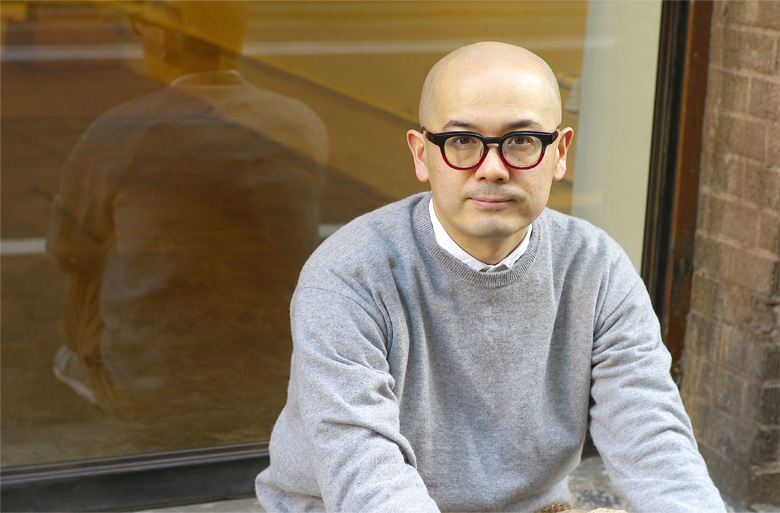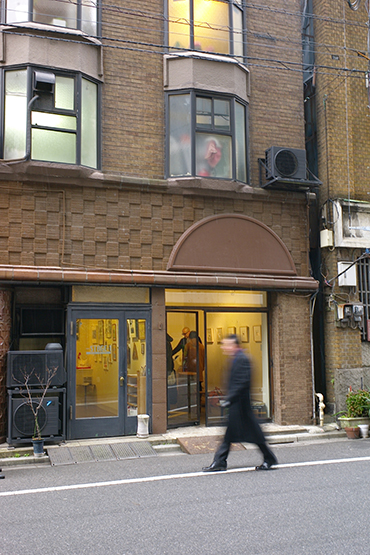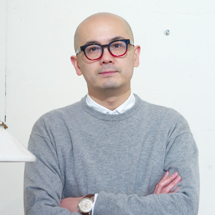
Streets and books, a collection of knowledge

The impulse to start a secondhand bookstore
ー Please tell me about the start of “Morioka Bookstore”
I currently have a bookshop in Ginza, but before that I had the Morioka Bookstore in Kayabacho for 8 years. And before that I worked in a long-established old bookstore in Jimbocho (Kanda area) named “Isseido Bookstore” for 8 years as well. At that time I didn’t plan to be independent and own a bookstore but I loved Jimbocho and was thinking of staying there until I would retired. One day I was in Kayabacho and I came across a very nice building, and when I entered the building, there was a very nice old-fashioned thrift shop in it as well. But that shop had a lease sign in front of it, so the idea of opening a second hand bookstore quickly arise from then.
ー So that was the turning point in opening the bookstore?
Yes, the idea of having my own shop grew quickly from that moment and I decided to do it. The really nice building was really the important part of all the decision because I felt that if we opened the bookstore in this particular building, I had the intuition the customers were gonna be pleased to come.
ー When did the lease sign was removed and when did you opened the store?
I saw the sign in January 2006 and I quit my job in April of the same year, I opened the store in July right after that, it only took half a year to opened the shop from the moment I saw the sign. Actually last year was the 10th anniversary of the shop.
ー Congratulations ! What does books represent for you in your life?
Of course I like books but I also love the Kanda Jimbocho area because of all the bookstores that are gathered there. There is around 100 bookstores in Jimbocho alone and it seems there’s not so many bookstore area like this in the world, so I always had a longing to work here.
ー Jimbocho is said to be a place where the knowledge accumulates, it’s like there’s a magnetic field around Kanda that attract people.
That is true, in this day and age I was still attracted to these secondhand book stores and I naturally started working there. As I said earlier, I really like books but I think it is because of the atmosphere of the area and the fact I love Jimbocho that made me want to start all of this.
ー It is true, when you consume anything, the content becomes past really quickly, but with books it is different because the knowledge stays with you after consuming it.
That’s right but that’s what is interesting in books. For me there’s a difference between getting knowledge with a book or with new technologies like internet even though the content is the same the content we consume with internet usually just go through us and doesn’t stay, in the contrary what you read from books is stored in you. Maybe it’s a point of view because I’m not from the same generation but I do think these two methods are really different.
ー When you read a book there’s this feeling that you’re accumulating knowledge. I think there’s also more possibilities with books.
But I’m curious when children of this day and age of internet will become adults, I wonder if they’ll also feel different with their younger generation as well.
ー You’ve been doing work related to books in Jimbocho, Kayabacho and Ginza, but what is the charm of these area?
Regarding Jimbocho there are many statues in this area, and all the pile of books you see in front of old bookstores or in storehouses that’s what make the charm of a city but it can also be describe by how people make you feel. In Jimbocho I met someone who taught me a lot, that person also taught me how to behave in society, how to eat sushi, how to drink alcohol, how to eat buckwheat... That person is Mr. Matsumura of the bookstore Matsumura. He said something really important that stuck with me until now, he said that the qualities that should be important in being human are honesty, straightforwardness and cheerfulness that we can’t learn from our school days.
More than just a bookstore but also a “place” for people to gather.

-
ー What would you recommend to start a bookstore and be successful with it?
When I was working in Ginza the bookstore had a gallery space that can held somes events, I organized some publication events several times a year, and at that time a lot of customers came and there was good sales on the book. Everyone was very excited by the author’s new published book, at these kind of event everyone share their opinions on common interests, favourite authors… That’s why I thought even if it was a bookstore, the concept will be that I only needed to sell one book at a time, and that the important thing when I was having these released book events was that people gathered together to share their excitement toward one subject.
ー Beside your work at the bookstore you seem to also be active in talk events and writing books or articles, but you’re also taking part in the organization of the “Terrace Square Photo Exhibition”. Tell us why and what you’re trying to achieve with this event?
Japan is also known worldwide for its large photo collection. I hope that when people pass in front of the entrance of the building and see the exhibition, they can see how rich the photo culture scene is in Japan. I want this exhibition to be a place to nurture the talents of japanese photographers and where people can enjoy and discovers stills of life. In that sense I think this exhibition is a good place to convey the japanese contemporary scene.
ー So your bookstore concept of selling only one book is pretty rare and unique in the world, do you have any other ideas for future projects?
I have a lot of ideas for example I’d love to open a hotel with for particularity that a library would be the core of the concept for that hotel, I also want to be more and more involved in the art scene and be a curator to the public about arts and crafts by opening a place like a museum to display and organize all of these kind of events. I had this idea recently as well to create a book cafe that is based on the idea of an old book cafe from 100 years ago, where there will be magazine and newspapers of that time until our time exposed. Wouldn’t it be interesting to see the evolution of how the information lived from then until this modern day and age where information is constantly and rapidly changing ? I’d like to open a place like that, maybe in between Kanda and Manseibashi areas, there is a place called “Kanda Suda-cho” underneath the floating railway tracks where the vibe is different because of the bricks materials.



